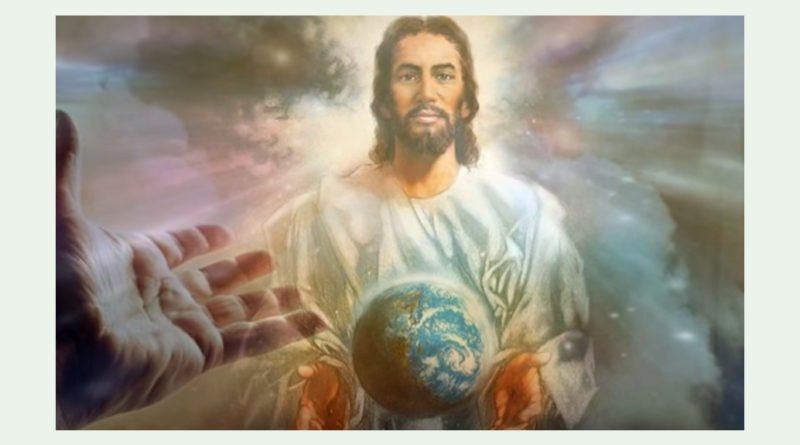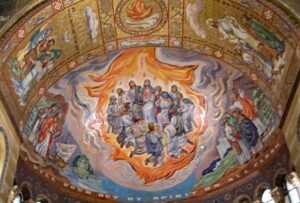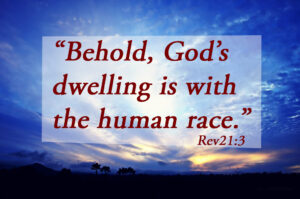SEEING BEYOND OUR “ORDINARY” PERCEPTIONS
One of the hardest things for us humans to comprehend about the Incarnation is that God is inviting us to experience our time here on earth in a different way than we may now imagine. Our perceptions of “our” world are colored – oh, so colored! – by our human senses1 that provide only glimpses into the fullness of the reality that truly is. We tend to stop at the physical data we perceive, when perhaps God intended our senses to be telescopes into the nature of God, ourselves and all around us. We often fail to grasp all but the simplest, most superficial ideas that sensory input offers us. How much does what we “sense” reveal about God, simply in God making us able to observe what we observe through the senses? Are sight, hearing, taste, smell and touch also able to introduce us to a Spirit-world beyond the physical objects we perceive?

The next time you look at a flower – for instance, a rose – consider its construction and its life from beginning to end. The rose itself is a unity of petals – a oneness consisting of many slightly and significantly diverse parts. Consider the rose’s life-cycle from bud to bloom to diminishment, not unlike our own life-progression. Many non-rose elements: nutrients, sunlight, water, etc., contribute to the rose’s life-cycle – a phenomenon duplicated in so many other living organisms. Is a rose just a rose, or is it something that can reveal to us something about the “nature” of God?
ADVENT: A TIME TO THINK OF THE INCARNATION THROUGH THE LENS OF AN ADULT FAITH
Many of our religious perceptions of Christmas and the Incarnation originate from what we grasped, with a child’s mind, of the very adult concepts someone tried to teach us. How many books or articles about the Catholic meaning of Christmas and the Incarnation have you read in the past few years? Let’s engage in some adult reflection on the Incarnation – on Jesus, the God-Man in our midst.
Ponder: How does your understanding of the Incarnation – God becoming one of us – differ from what it was when you were younger? What unanswered questions do you have about why God would become a human person? (Pose those questions to God in prayer.) What impact does knowing that Jesus is both God and man have on your sense of closeness to God and your potential as a fully human person?
JESUS – HUMAN TO THE FULLEST
Psychologist Abraham Maslow proposed that, while most people have the potential to reach full humanness, which Maslow called self-actualization, only a few, perhaps as few as 10%, achieve it. People seem to concentrate on their need for self-defense, food and safety, rather than on developing their full humanness.2 Perhaps this is because it is much harder to figure out what being fully ourselves is, or how to achieve it. Enter Jesus. But what do we know of Him and what His presence on earth signifies?
Ponder: How much time do you spend nurturing your personal growth, moving into your own “full humanness” modeled on the growth you perceive as you get to know and love Jesus?
As we begin this new Liturgical Year, let us consider our personal life journey into the fullness that God, our Father, wants for us. Our faith, regardless of how feeble we may consider it to be, is bolstered by what God has breathed and is still breathing into us. Be open to that gentle Spirit stirring within you.
Stretch your thinking and your imagination while pondering this: We see the Incarnation as God entering into the world in the form of a human being, and that it truly is. But focusing only on this aspect of the Incarnation may be limiting our perception of the Triune God’s permeating presence in the world. Maybe God’s message in the Incarnation is also that “our” world is bigger than we think. Could not a purpose of the Incarnate Jesus’ earthly existence, a life lived in concert with the Father and the Spirit, be this: to help us realize that, even though we and our world cannot contain God, God and God’s “universe” are permeating our world and us as much as or more than we are? Perhaps we humans were (are?) missing this. Perhaps Jesus came to encourage us to change our perception of reality to one where we perceive our Triune God truly present in this world now. Can I perceive this?
Let us ponder this as we begin this new Liturgical Year.
- What does the Incarnation mean to you personally?
- How can you share more deeply your presence in the St. Michael community (or your own Church community) that gathers each weekend in God, the Eternal Now3?
Sister Loretta Fernandez RSM
- Our senses are faculties through which we receive data for perception.
- Self-actualization Myths: What did Maslow Really Say?, William C. Compton, Ph.D., Middle Tennessee State University, 2018
- Jesus’ primary metaphors for the Eternal Now are ‘the kingdom of God’ and ‘the kingdom of heaven.’ He is not talking about a far-off celestial heaven. ‘Look around you, look at the fields; already they are ready for harvest! Already the reaper is being paid his wages, already he is bringing in the grain for eternal life, and thus sower and reaper rejoice together’ (John 4:35-36, Jerusalem Bible). Notice that Jesus says already three times. He is trying to tell us that there is a way that we can live connected to the Real and to the Eternal in this world.” The Eternal Now, Richard Rohr.





